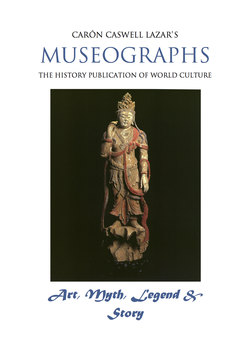Читать книгу Museographs: Art, Myth, Legend and Story - Caron Caswell Lazar - Страница 4
На сайте Литреса книга снята с продажи.
To Begin With
ОглавлениеIn the pantheon of legendry the definitions as they are stated above are generally accepted. And for this very reason peoples the world over often reject the use of the word myth being applied as a description of their cultural liturgy. Many indigenous societies around the world do not even have words in their languages equating to myth or legend. More often they view these recountings as stories.
Interestingly, although since the far removed time of Pindar (5I8-438BC) the word myth — stemming from the Greek muthos — has been more normally associated with the Latin word fabula — something essentially fictitious — it was originally more closely associated with the Greek logos, or a true historical tale. However in its primary sense muthos was simply anything that was imparted orally, by word of mouth, and so at its most basic root it denotes speech in general. From this the conclusion can be drawn that instead of being a sophisticated literary device, a myth as originally formulated was simply a response to a question. This question might have been posed internally by an enquiring mind, or a question asked directly, such as the query of a child: where do I come from? In the end the earliest myths were virtually all concerned with that singular question and they are known as creation myths.
Most often thought to have been formulated to answer the basic “where from?” “how?” “why?” questions of life, myths should have begun to disappear as humankind developed seemingly more logical, scientific explanations apparently supported by incontrovertible proofs. Yet they were not passed over or forgotten. Quite to the contrary many myths, thousands of years old, have survived and been cherished, lovingly and carefully handed down from generation to generation. Their persistence indicates that regardless of the human race’s acquisition of more and more extensive information about the ‘real’ nature of the universe, concurrent with that acquisition of information myths moved away from a sphere where their acceptance was dependent on their physical accuracy into one fulfilling a deeper purpose for mankind. In fact, throughout histories long passage during periods of upheaval the myths, legends and stories enjoy resurgence. The importance of the myth lay in what it communicated to the believer. The notion of a believer often coincides to the spiritual organization of a group or society.
An alternative thought as to their origin is that the myths are, like legends, based in fact and recall ancient origins no longer understood in their original historical context. The fact that so many scholars, writers and storytellers have liberally translated, revised, abridged and interpreted the original forms in order to read contemporarily and to be “relevant” to their times has indeed helped to muddy the truth about tales. More insidious editing was directed at enforced assimilation into a conqueror’s belief system.
Myths not only express the reflections of human beings on the fundamental meaning of life, they also have provided the foundation for the organization of individual societies because the way in which a society is organized derives its authority ultimately enshrined in its mythology. The role of the myth, seen from a societal vantage, is that of guardian or propagator of a moral code, providing its inhabitants with models on which they may base their own lives.
No longer merely narratives or symbolic accounts of how and why phenomena occurred, myths recount the actual workings of the supernatural. Whenever they are told or recounted they are often deemed to release or set in motion supernatural activity. For this reason, in some societies the names of certain deities are too sacred to be uttered except by elect and sanctified custodians of deep knowledge.
A myth is a historical narrative that may or may not turn out to be true. It is not simply beautiful literature grown out of an oral tradition it is access to the world view of a people, of their understanding themselves, their society, their relation to others and to their God or gods.
